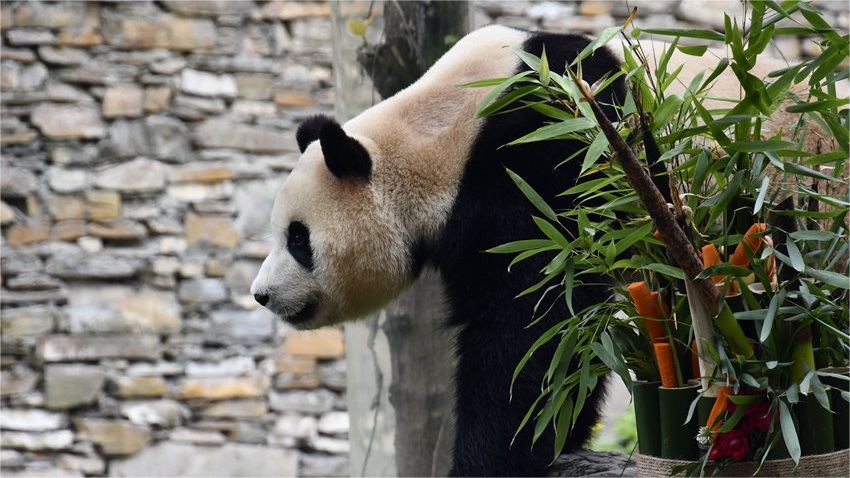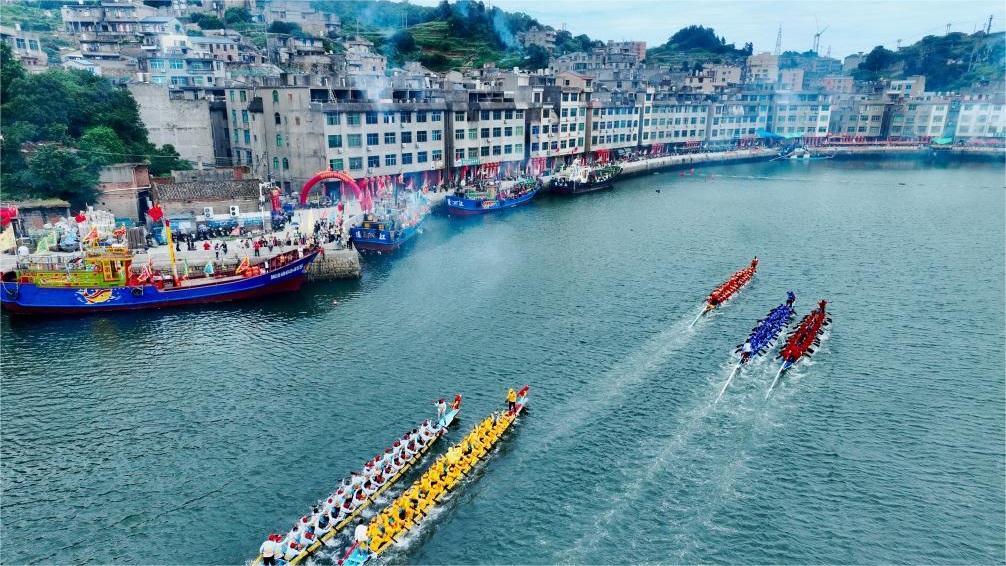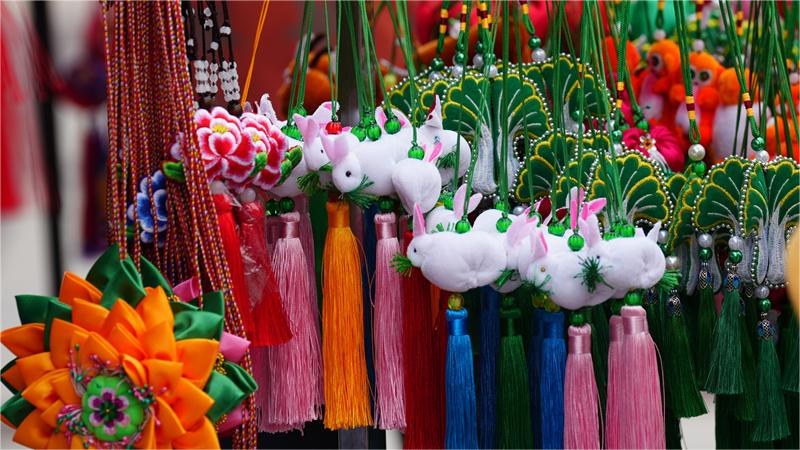Diversity, unity promote cultural progress in NW China's Xinjiang
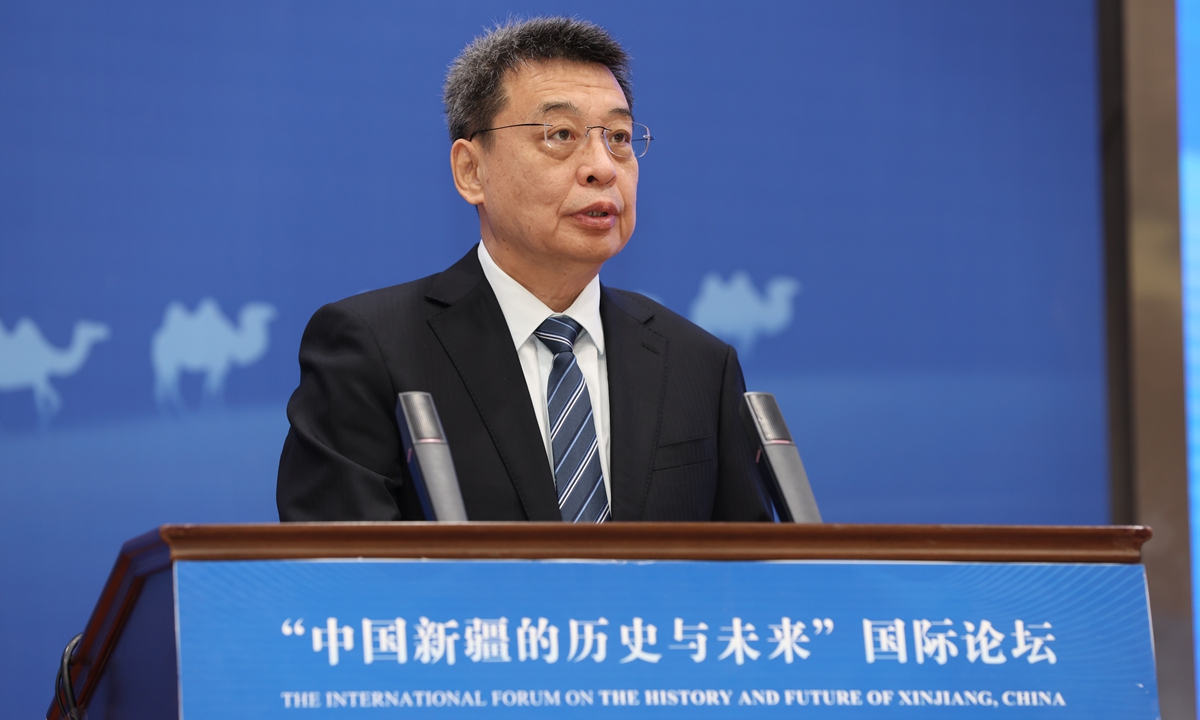
Pan Yue, director of the National Ethnic Affairs Commission, delivers a keynote speech at the International Forum on the History and Future of Xinjiang in Kashgar, Xinjiang on Wednesday. (Photo/National Ethnic Affairs Commission)
The International Forum on the History and Future of Xinjiang, China, was held on June 12 in Kashgar, northwest China's Xinjiang Uygur Autonomous Region, aiming to promote research on Xinjiang's cultural diversity and unity and boost cross-cultural exchange and learning between China and the global community.
During the forum's opening ceremony, Pan Yue, director of the National Ethnic Affairs Commission, said Xinjiang boasts a rich tradition of diverse cultures and religions coexisting harmoniously.
Xinjiang's rich religious heritage is a unique blend of ancient cultures, showcased by Buddhist sites, a 2,500-year-old Zoroastrian fire altar, and a 1,800-year-old Greek-style "winged angel" Buddhism mural, which merged with later Islamic influences, Pan noted.
Pan emphasized that Xinjiang's culture is a diverse yet cohesive whole, with Chinese culture serving as the common thread that binds its various elements together.
He also countered the misleading international narrative that wrongly portrays Xinjiang culture as separate from Chinese culture, saying that a wealth of archaeological evidence confirms that Xinjiang has always been an integral part of the Chinese cultural sphere.
Pan added that the diverse cultures that were introduced from all directions and developed in Xinjiang demonstrate the inclusiveness of Chinese culture.
The more inclusive and open it is, the more it is recognized, cherished, and maintained by all parties, ensuring the continuous and unbroken heritage of Chinese civilization to this day.
Pan addressed the internationally prevalent narrative that misrepresents Xinjiang culture as being "assimilated" into Chinese culture.
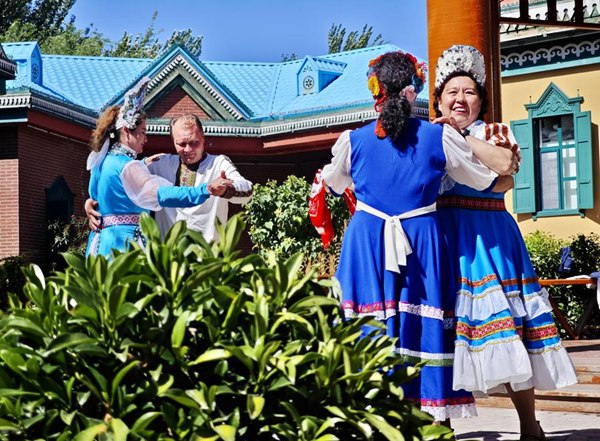
Residents of the Russian ethnic group perform folk dance on Liuxing Street in Yining City, Ili Kazak Autonomous Prefecture, northwest China's Xinjiang Uygur Autonomous Region, May 28, 2024. (Xinhua/Wang Fei)
He said this reflects a widespread ignorance of Chinese history.
Pan noted that people from China's Western Regions have long been contributors to Chinese culture, which is the collective creation and inheritance of various ethnic groups.
He also emphasized that a cultural community is built on the deep integration of the economy and society.
The economic structures of the Western Regions and the Central Plains are interdependent, with the Western Regions serving as a key conduit for communication across the Eurasian continent, thanks to their strong connectivity with the vast market of the Central Plains, Pan added.
Some foreign observers have raised concerns that Xinjiang's cultural identity may be lost if seen as an integral part of Chinese civilization. However, Pan countered that Western notions of "pluralism" often view diversity and unity as mutually exclusive, whereas Chinese philosophy takes a dialectical approach that reconciles and integrates seemingly contradictory elements.
Today, Confucianism, Buddhism, and Taoism have not merged into a single entity but rather have intermingled, creating a broader spiritual community for the Chinese people that embodies unity in diversity, Pan explained. Islam, too, entered China and underwent a similar integration process, he said.
Both Buddhism and Islam, upon entering China, experienced collisions and integrations, eventually developing in the Chinese context, said Pan.
The process of collision and integration aimed to enhance each other, rather than eliminate one another, ultimately contributing to the emergence of more advanced civilizations, he said.
Pan added that the story of Xinjiang serves as a testament to the enduring vibrancy of Chinese civilization through its inclusive nature.
Pan urged politicians and scholars worldwide who are concerned about China to study Chinese President Xi Jinping's concept of integrating Marxism with China's excellent traditional culture. This integration has produced a profound "chemical reaction," creating a new, organically unified cultural entity, he explained.
Throughout history, civilizations have long embraced diversity and pursued unity and solidarity in their own distinct ways. While they may not always see eye-to-eye on the path to achieving this unity, it is hoped that they can draw on their collective strength to strive for it, Pan said.
Photos
Related Stories
- 8th China-Eurasia Expo set for June 26-30 in Xinjiang
- Int'l forum on Xinjiang's history, future held in Kashgar
- Amazing Xinjiang: Nang, the indispensable staple for the people of Xinjiang
- Cultures in Xinjiang propel civilization
- Xinjiang sees sports venues boom, adding 30,000 in 5 years
- Xinjiang sees tourism boom during Dragon Boat Festival
- 7-day event featuring hiking and camping launched in Baicheng, China's Xinjiang
- Scenery of Lujiaowan scenic area in Xinjiang
Copyright © 2024 People's Daily Online. All Rights Reserved.






